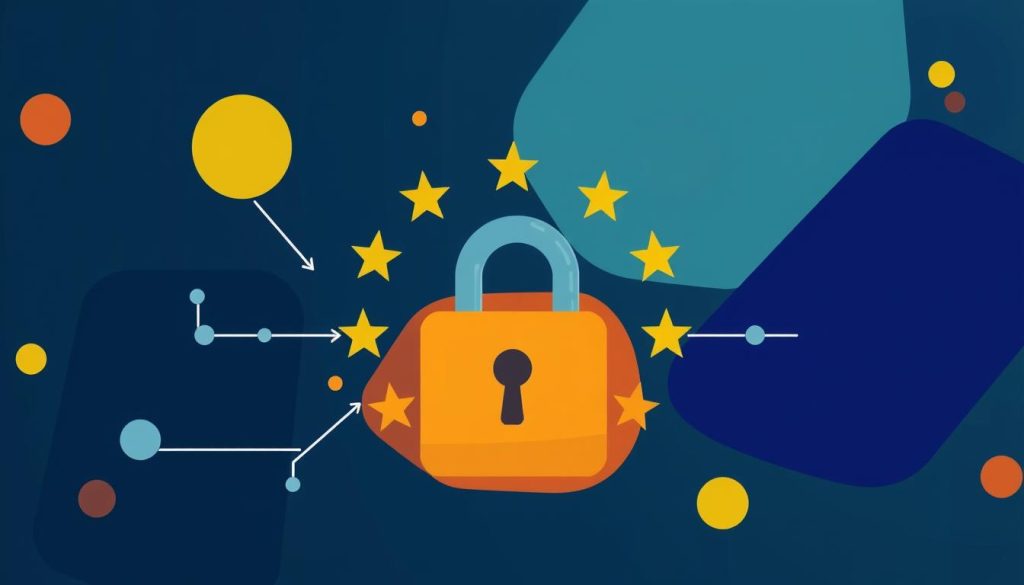In today’s digital landscape, online lead capture has become a vital component of successful marketing strategies. However, with the implementation of the General Data Protection Regulation (GDPR), businesses must navigate the complexities of data privacy and protection to ensure compliance while effectively generating valuable leads. This comprehensive guide will explore the importance of GDPR compliance in online lead capture and provide actionable strategies to help businesses protect their customers’ personal data while unlocking the full potential of their lead generation efforts.
Key Takeaways
- Understanding the GDPR and its impact on online lead capture
- Obtaining valid consent for data collection and effective consent management
- Securing and protecting personal data through encryption and access controls
- Maintaining transparency and providing data subject access rights
- Conducting data protection impact assessments and appointing a data protection officer
Understanding the GDPR and Its Impact on Lead Generation
The General Data Protection Regulation (GDPR) is a comprehensive EU data privacy law that has transformed the way businesses handle personal information. Implemented in 2018, the GDPR aims to protect the fundamental rights and freedoms of individuals by ensuring the lawful, fair, and transparent processing of their data.
What is the GDPR?
The GDPR is a set of regulations that govern the collection, storage, and use of personal data within the European Union. It establishes strict guidelines for companies to follow when handling customer data, including requirements for obtaining consent, securing data, and providing transparency.
Why is GDPR Compliance Important for Online Lead Capture?
For businesses engaged in online lead generation, GDPR compliance is crucial. Companies must ensure that they are collecting, storing, and using customer data in a manner that aligns with the regulation’s principles. Failure to comply can result in hefty fines and reputational damage, potentially undermining the effectiveness of the organization’s lead capture efforts.
By understanding and adhering to the GDPR, businesses can build trust with their customers, strengthen their online lead generation strategies, and avoid costly penalties. This is essential in today’s data-driven world, where customer privacy and data protection are top priorities.
| Key GDPR Principles | Description |
|---|---|
| Lawfulness, Fairness, and Transparency | Personal data must be collected and processed lawfully, fairly, and in a transparent manner. |
| Purpose Limitation | Personal data must be collected for specified, explicit, and legitimate purposes and not further processed in a manner that is incompatible with those purposes. |
| Data Minimization | Personal data must be adequate, relevant, and limited to what is necessary in relation to the purposes for which they are processed. |
| Accuracy | Personal data must be accurate and, where necessary, kept up to date. |
| Storage Limitation | Personal data must be kept in a form that permits identification of data subjects for no longer than is necessary for the purposes for which the personal data are processed. |
| Integrity and Confidentiality | Personal data must be processed in a manner that ensures appropriate security of the personal data, including protection against unauthorized or unlawful processing and against accidental loss, destruction, or damage. |
Obtaining Valid Consent for Data Collection
Under the GDPR, businesses must obtain freely given, specific, informed, and unambiguous consent from individuals before collecting and processing their personal data. Effective consent management is crucial for ensuring compliance and building trust with your audience.
Best Practices for Consent Management
Implementing the following best practices can help you effectively manage GDPR consent and optimize your lead capture forms:
- Design clear and transparent GDPR consent opt-in forms that explain how you will use the collected data.
- Provide users with granular control over their opt-in consent, allowing them to choose which data they are willing to share.
- Implement a robust consent management system to record and maintain detailed records of user consent.
- Regularly review and update your privacy policies to ensure they accurately reflect your data collection and usage practices.
- Make it easy for users to withdraw their consent and request the deletion of their personal data at any time.
| Best Practice | Description | Benefits |
|---|---|---|
| Transparent opt-in forms | Provide clear explanations of how data will be used | Builds trust and ensures informed GDPR consent |
| Granular user controls | Allow users to choose which data they share | Empowers individuals and supports opt-in consent |
| Robust consent management | Maintain detailed records of user consent | Demonstrates compliance and supports data collection practices |

By following these best practices, you can ensure that your lead capture forms and data collection processes are fully compliant with the GDPR and build trust with your audience.
Securing and Protecting Personal Data
In the digital age, safeguarding customer data is of paramount importance, especially in the face of growing cyber threats and the stringent requirements set forth by the General Data Protection Regulation (GDPR). Businesses must implement robust data security and data protection measures to ensure the confidentiality, integrity, and availability of personal information.
Data Encryption and Access Controls
A crucial aspect of GDPR compliance is the implementation of encryption techniques to protect sensitive data. By encrypting personal information, businesses can mitigate the risk of unauthorized access and ensure that even in the event of a data breach, the data remains unreadable and unusable to malicious actors. Additionally, access controls play a vital role in limiting access to sensitive data, ensuring that only authorized personnel can view and interact with customer information.
Data Retention and Disposal Policies
The GDPR also mandates that businesses establish clear data retention and data disposal policies. Organizations must only retain personal data for as long as necessary to fulfill the purpose for which it was collected and ensure the GDPR compliance. When the data is no longer needed, it must be securely disposed of in accordance with industry best practices and regulatory requirements.
| Measure | Importance | Key Benefits |
|---|---|---|
| Data Encryption | Protects sensitive information from unauthorized access |
|
| Access Controls | Limits access to personal data based on user roles and permissions |
|
| Data Retention and Disposal Policies | Ensures personal data is only stored for as long as necessary and is securely disposed of when no longer needed |
|
By implementing robust data security and data protection measures, organizations can not only comply with the GDPR but also build trust with their customers and reduce the risk of costly data breaches and regulatory penalties.
GDPR compliance in online lead capture
As businesses strive to generate valuable leads through online platforms, they must navigate the complex landscape of GDPR compliance. This critical regulation aims to protect the personal data of EU citizens, and its impact on the lead capture process cannot be overstated. Businesses must ensure they are collecting and processing customer data in a lawful, transparent, and secure manner to avoid hefty fines and maintain trust with their audience.
At the heart of GDPR compliance in online lead capture lies the principle of consent. Businesses must obtain explicit, informed, and freely given consent from individuals before collecting and processing their personal data. This includes details such as name, email address, phone number, and any other sensitive information. Implementing robust consent management practices, such as clear opt-in and opt-out mechanisms, is essential to meeting GDPR requirements.
| GDPR Requirement | Implication for Online Lead Capture |
|---|---|
| Lawful, fair, and transparent data processing | Clearly communicate how customer data will be used and provide easy access to privacy policies. |
| Obtaining explicit consent | Ensure that lead capture forms include explicit consent checkboxes or opt-in mechanisms. |
| Data minimization | Collect only the personal data necessary for the specific purpose of lead generation. |
| Data security and protection | Implement appropriate technical and organizational measures to safeguard customer data. |
Compliance with GDPR in online lead capture is not merely a legal requirement but a strategic imperative for businesses. By prioritizing data privacy and transparency, organizations can build trust with their customers, enhance their brand reputation, and position themselves as leaders in the era of heightened data protection.

Maintaining Transparency and Providing Access Rights
The GDPR emphasizes the importance of transparency in data processing and the rights of data subjects (individuals whose personal data is collected). Businesses must ensure they maintain GDPR transparency by clearly communicating how they collect, use, and safeguard personal information during the online lead capture process.
Enabling Data Subject Access Requests
A crucial aspect of GDPR compliance is empowering data subjects to exercise their rights, including the right to access, rectify, or delete their personal data. Businesses must establish streamlined processes to handle data subject access requests (DSARs) and respond to them within the GDPR’s mandated time frame of one month.
To enable effective data access requests, companies should:
- Provide clear instructions on their website for submitting DSARs, including the necessary information and contact details.
- Implement robust identity verification procedures to ensure the authenticity of the request and protect against unauthorized access.
- Develop efficient internal workflows to review, process, and respond to DSARs in a timely manner.
- Ensure the requested information is delivered in a structured, commonly used, and machine-readable format, as required by the GDPR.
By maintaining GDPR transparency and empowering data subjects to access and manage their personal information, businesses can build trust, enhance their online lead capture practices, and demonstrate their commitment to data privacy and protection.
| GDPR Requirement | Key Considerations |
|---|---|
| Data Subject Access Requests |
|
| GDPR Transparency |
|
Conducting Data Protection Impact Assessments (DPIAs)
As businesses strive for GDPR compliance in their online lead capture practices, one crucial step is conducting a Data Protection Impact Assessment (DPIA). A DPIA is a process that helps organizations identify and mitigate potential risks associated with their data processing activities. This assessment is particularly important when the processing is likely to result in a high risk to the rights and freedoms of individuals.
The purpose of a DPIA is to ensure that businesses fully understand the implications of their data processing activities and implement appropriate measures to protect personal data. By conducting a thorough risk assessment, businesses can identify areas of concern and develop strategies to address them, ultimately enhancing their overall GDPR compliance.
The DPIA Process
- Identify the data processing activities that require a DPIA, such as the collection, storage, or use of personal information.
- Assess the potential risks to individuals’ rights and freedoms, considering factors like the nature, scope, context, and purposes of the processing.
- Develop and implement appropriate risk mitigation strategies to address the identified risks.
- Document the entire DPIA process and maintain records to demonstrate compliance with GDPR requirements.
By proactively conducting a DPIA, businesses can gain valuable insights into their data processing operations and ensure they are meeting the GDPR compliance standards set forth by the regulation.

| DPIA Requirement | Description |
|---|---|
| Systematic Description | Businesses must document a comprehensive description of the data processing activities, including the purposes, the data subjects, the categories of personal data, and the recipients of the data. |
| Assessment of Necessity and Proportionality | Organizations must evaluate whether the data processing activities are necessary for the intended purposes and proportional to the risks posed to individuals. |
| Risk Assessment | Businesses must identify and assess the risks to the rights and freedoms of individuals resulting from the data processing activities, considering both the likelihood and severity of the risks. |
| Risk Mitigation Measures | Organizations must implement appropriate measures to mitigate the identified risks and ensure the protection of personal data. |
By incorporating a robust DPIA process into their online lead capture strategies, businesses can demonstrate their commitment to GDPR compliance and safeguard the personal data of their customers and prospects.
Appointing a Data Protection Officer (DPO)
Under the General Data Protection Regulation (GDPR), businesses may be required to appoint a data protection officer (DPO) to oversee their GDPR compliance efforts. The DPO plays a crucial role in ensuring the proper data privacy and data governance practices within an organization.
Roles and Responsibilities of a DPO
The primary responsibilities of a DPO include:
- Monitoring the organization’s compliance with the GDPR and other applicable data protection laws.
- Providing guidance and training to employees on data protection best practices.
- Serving as the main point of contact for data subjects, handling their inquiries and complaints related to data processing.
- Conducting data protection impact assessments (DPIAs) to identify and mitigate risks associated with data processing activities.
- Cooperating with supervisory authorities, such as data protection agencies, and serving as the liaison between the organization and these authorities.
To effectively carry out these responsibilities, the DPO must have a deep understanding of the GDPR, as well as the organization’s data processing operations and risk profile. They should possess strong analytical and problem-solving skills, excellent communication abilities, and a commitment to upholding data protection principles.
“The DPO is a crucial role in ensuring GDPR compliance and protecting the privacy of individuals whose data is processed by the organization.”
Handling Data Breaches and Incident Response
In the digital age, even the most diligent businesses can fall victim to data breaches. When a security incident occurs, companies must be prepared to respond swiftly and effectively to mitigate the impact on their customers and comply with the GDPR’s notification requirements.
The GDPR mandates that organizations notify the relevant supervisory authority of a data breach within 72 hours of becoming aware of it, unless the breach is unlikely to result in a risk to the rights and freedoms of individuals. Additionally, if the breach is likely to pose a high risk to affected data subjects, the organization must also inform those individuals without undue delay.
- Prompt notification is crucial to allow the supervisory authority and affected individuals to take appropriate action to protect themselves from potential harm.
- Companies must also implement appropriate incident response measures to address the breach, such as containing the issue, recovering the data, and reviewing their security practices to prevent similar incidents in the future.
- Failing to comply with the GDPR’s data protection and notification requirements can result in significant fines and reputational damage.
By being prepared for the eventuality of a data breach and having a robust incident response plan in place, businesses can minimize the risks and demonstrate their commitment to GDPR compliance and the protection of their customers’ personal data.

“The best defense against a data breach is to be prepared for one.” – Cybersecurity Expert
Partnering with GDPR-Compliant Lead Capture Solutions
As businesses continue to embrace online lead capture tools to fuel their growth, it’s crucial to ensure that these solutions are fully compliant with the General Data Protection Regulation (GDPR). Partnering with GDPR-compliant service providers can not only safeguard your customers’ personal data but also help you avoid the steep penalties and legal consequences associated with non-compliance.
Evaluating Third-Party Service Providers
When selecting a lead capture tool or any third-party service provider, it’s essential to conduct a thorough evaluation to ensure GDPR compliance. Here are some key considerations:
- Data processing agreements: Ensure that the service provider has established robust data processing agreements that clearly outline their responsibilities and your rights regarding the handling of customer data.
- Consent management: Look for solutions that offer advanced consent management features, allowing your customers to easily review, update, and withdraw their consent for data collection.
- Data security: Assess the provider’s data security measures, including encryption, access controls, and data retention policies, to safeguard your customers’ personal information.
- Vendor management: Establish a comprehensive vendor management program to monitor the service provider’s ongoing compliance with GDPR requirements and address any potential issues promptly.
By partnering with GDPR-compliant lead capture solutions, you can streamline your online lead generation efforts while ensuring the protection of your customers’ data and maintaining regulatory compliance.
“Investing in GDPR-compliant lead capture tools is not only a legal necessity but also a strategic move to build trust and loyalty with your customers.”
Conclusion
As we’ve explored throughout this guide, achieving GDPR compliance in online lead capture is not just a legal requirement – it’s a strategic imperative for businesses seeking to build long-term success and customer trust in the digital age. By prioritizing data protection, transparency, and consent-based data collection, organizations can position themselves as leaders in their industry and unlock new opportunities for growth.
The key takeaways from this guide are clear: GDPR compliance is essential for safeguarding customer data, fostering stronger relationships with your audience, and driving sustainable business success. By aligning your lead capture practices with the GDPR’s principles, you can demonstrate your commitment to data privacy, enhance your brand reputation, and cultivate a loyal customer base that trusts your organization to handle their personal information responsibly.
As you navigate the evolving landscape of data protection regulations, remember that GDPR compliance is not a one-time task, but an ongoing process of continuous improvement. Stay vigilant, regularly review your policies and procedures, and work closely with GDPR-compliant service providers to ensure your online lead capture strategies remain robust and adaptable. By embracing GDPR compliance, you’ll not only protect your business from potential legal risks but also position it for long-term growth and success in the digital marketplace.




